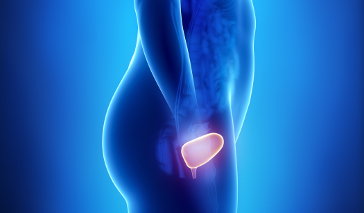Overactive bladder occurs when there is a frequent and sudden urge to urinate. The impulse may be very strong and uncontrollable, causing urine to leak (urinary incontinence).
What is the Bladder?
The bladder is a muscular, elastic organ located in the lower abdomen that collects urine secreted by the kidneys. At the bottom of the bladder is the urethra, which is controlled by a sphincter muscle, through which urine leaves the body. When urine is released, the sphincter muscle relaxes while a bladder muscle contracts, allowing urine to pass out of the body. A typical bladder can hold slightly over two cups of fluid, although the urge to urinate can start with as little as five ounces of urine in the bladder.
What Causes Overactive Bladder?
Normal bladder function requires the coordination of kidneys, muscles, and nerve signals. Problems anywhere in the system can result in an overactive bladder. In most instances, involuntary bladder contractions create the need to urinate. Several different conditions can contribute to this, including:
- Neurological disorders such as strokes, multiple sclerosis and Parkinson’s disease
- Increased urine production caused by underlying medical conditions such as kidney disease or diabetes
- Medications that cause an increase in the production of urine
- Infections of the urinary tract or kidneys
- Conditions that change the structure of the bladder, such as bladder tumors or bladder stones
- Conditions that impact the flow of urine out of the bladder, such as an enlarged prostate or scar tissue from surgery on the urethra or bladder
What are the Symptoms Associated with Overactive Bladder?
Symptoms of overactive bladder include:
- A frequent and sudden urge to urinate (urinary urgency)
- Involuntary loss of urine (urge incontinence)
- Increased urinary frequency during the daytime (e.g., urinating more than eight times in a 24 hour period)
- Increased urinary frequency at night (nocturia)
Although many patients may ignore symptoms associated with overactive bladder because they believe they are a normal part of aging, the condition typically has an underlying medical cause.
How is Overactive Bladder Diagnosed?
A physician starts by first checking for infection, asking about a person's urinary habits (including whether or not the bladder completely empties during urination), and performing a physical exam to look for abnormalities in the abdomen or genitals. After that, a neurological exam can determine if nerve or sensory problems are impacting bladder function.
If results of these exams are inconclusive, additional diagnostics include:
- Measuring post-void residual urine: To determine how much urine remains in the bladder following urination, an ultrasound visualizes the bladder as a catheter is used to remove post-void residual urine. The urine volume is measured; significant amounts can cause symptoms of overactive bladder.
- Measuring urine flow rate: This test will require the patient to urinate in an uroflowmeter, which provides a graph of the patient's urine flow rate.
- Cystometry: Cystometry gauges the pressure inside of the bladder. One catheter fills the bladder with warm water while a pressure sensor is inserted in the vagina (woman) or rectum (male) to measure the rigidity of the bladder muscle and assess its ability to hold in and push out fluid.
How is Overactive Bladder Treated?
Alleviating overactive bladder typically involves a combination of treatments designed to address not only the symptoms but the underlying cause of the condition. Medication can target specific symptoms, while behavioral interventions such as double voiding and bladder training may useful for controlling the problem long term.
References
Riley, J. (2012, September 1). Urinary incontinence. Conditions & Procedures, 1-3.


